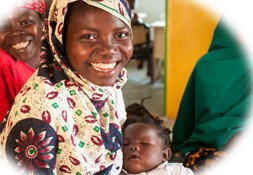Speeches Shim
TRANSFORM NUTRITION ![]() (pdf - 326k)
(pdf - 326k)
BACKGROUND
Mozambique – ranked 170 of 188 countries on the Human Development Index – faces significant development challenges. The country is largely dependent on agriculture (mostly subsistence-based with small family farms) and is vulnerable to drought and natural disasters. 66% of the population live in rural areas, most live below the poverty line, and one-third is chronically food-insecure with high child stunting. The situation is worse in Nampula – Mozambique’s largest, most densely populated province –particularly for pregnant and lactating women, adolescent girls, and children under 2. The most recent surveys show that Nampula has the highest stunting rate for children under 5 at 55%, a full 12% higher than the national average. 51% of adolescent girls are anemic, early marriage and pregnancy rates are among the highest in the country, and women and girls face extreme socio-economic exclusion. The causes of and contributing factors to malnutrition are complex including inadequate food intake; diets low in micronutrients and protein; gender inequity in access to nutritious foods; misconceptions about nutritious diets; poor infant and young child feeding practices; poor sanitation; and low dietary diversity.
PROGRAM DESCRIPTION
TN will strengthen host government capacity to plan and manage nutrition programming; increase adoption of optimal behaviors to improve the nutritional status of target populations; and increase access to quality services and products for nutrition, sanitation, and hygiene. TN will operate in 12 districts in Nampula. At its core, TN will utilize innovative behavior change strategies at the community level coupled with small scale agricultural interventions to improve the dietary diversity of the target populations. It focuses on improving nutrition knowledge and skills, increasing access and affordability of nutritious foods and strengthening the capacity of community members and leaders in nutrition, sanitation and hygiene. Activities include creating community-based nutrition groups and girls clubs; creating home vegetable gardens and leveraging other food supply chain programs to increase access to and affordability of nutritious foods; training and mobilizing community champions to advocate for better nutrition and hygiene behaviors and developing community radio and video programs advocating nutrition and hygiene behavior change. TN will target improved access to basic sanitation, leading to increased soap usage, water treatment and open-defecation free (ODF) communities. TN will operate within and through existing structures at central, provincial, and community levels, with the main focus being the community.
EXPECTED RESULTS AND IMPACTS
These interventions will cover at least 80% of the populations in the 12 targeted districts, improving the nutritional status of at least 118,000 pregnant and lactating women, 260,000 adolescent girls and 165,000 children under two. It will create sustainability at the community level by strengthening and training 633 community health workers and recruiting an additional 191 community activists and 7866 volunteers to work on community-level nutrition activities and service provision. TN will strengthen local systems to better implement the government of Mozambique’s nutrition strategies and policies and to better respond to food shocks from natural disasters. Transform Nutrition is expected to achieve:
- 10% reduction in the prevalence of stunted children under 2
- Less than 3% prevalence of wasted children under 2
- 10% increase in the prevalence of healthy weight children under 2


Comment
Make a general inquiry or suggest an improvement.